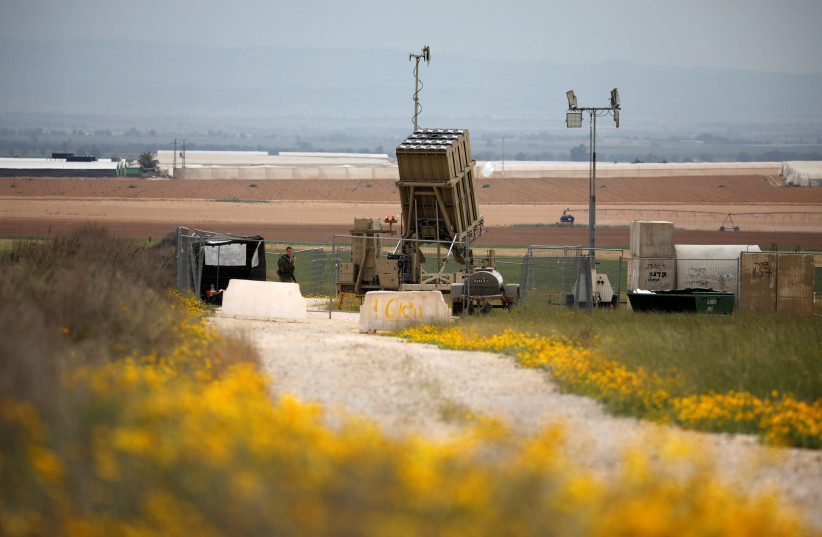How an addiction to the Iron Dome doctrine has eroded Israel’s deterrence
Over the past decade, Israel’s air defense, particularly the Iron Dome, provided Israel with the time and protection to not have to rush into wars in Gaza.
That all changed on October 7, 2023, when Hamas massacred more than 1,000 people using old-style tactics of a human wave attack that easily crumbled Israel’s hi-tech defenses—a decade of relying on technology and reducing ground forces led to an extreme neglect of basic security doctrines.
Since then, Israel has continued to rely on air defenses to protect itself against rocket fire from Gaza, Hezbollah, and other Iranian-backed proxies in Yemen, Syria, and Iraq. In each case, the decision to rely on a strategy rooted in air defense has reduced Israel’s deterrence of its enemies. For instance, in the north, Israel preferred to evacuate people from the border rather than fight Hezbollah.
Israel’s historic leadership, going back to the days of David Ben-Gurion, understood that the country faced serious enemies and that the best way to defend against them was to go on the offense and defeat them quickly. Israel understood that letting its enemies ring it with advanced weapon systems would imperil the Jewish state. This is why Israel always sought to root its doctrine in acquiring new advanced game-changing weapons and denying its enemies similar weapons.
When necessary, Israel was prepared to make sacrifices and send soldiers on daring missions to do everything possible to protect the state.

This all changed in the last decade and a half as Israel’s strategy changed. The country shifted from being ready for daring, rapid wars to defeat enemies to becoming a society surrounded by walls. It allowed enemies like Hezbollah and Hamas to become exponentially more powerful, and Israeli security experts told the public this was fine because Israel was also advancing in its military abilities. Israelis were told that precision munitions could neutralize threats.
Iran was able to advance closer to Israel’s borders since 2015, moving move forces into Syria and growing militias in Iraq and Yemen. As the militias acquired new missiles and drones, Israel relied on the same air defenses and doctrine. Even as Israel told itself it had a new “Momentum” doctrine in the army, it didn’t really seem to believe it. This was because it trained for multi-front wars, but when it came down to it, it didn’t actually want to engage in wars that required the kind of rapid maneuver and short-term sacrifice required.
After October 7, Israel has continued to rely on a doctrine rooted in air defenses as a strategy. It has evacuated the north and south and believes air defenses continue to buy it time. The concept of Iron Dome buying Israel time to decide worked when Israel’s enemies couldn’t penetrate the air defenses and when the Israeli public wasn’t affected much by the war.
However, even in those previous conflicts, such as clashes in Gaza in 2018 and 2021, the conflicts were short. Living under endless rocket fire and evacuating the borders is not a doctrine for success. Israel’s enemies today are not deterred. They believe they have caught Israel in a trap in which Israel continues to rely on precision strikes and proportional attacks.
Israel’s leaders of old understood this would be a recipe for disaster. Israel can’t meet its enemies man-for-man. Israel is a small state, and it can’t afford to end up like Lebanon or Iraq. It is a modern state that relies on trade and wants to be part of the First World. Endless wars against Hamas, Hezbollah, and a half dozen other Iranian proxies are not a recipe for Israel’s historic successes.
It was once believed that the Iron Dome would buy Israel the time to make rational decisions rather than be plunged into wars in haste. Today, it is clear that relying on this as a strategy has led to endless caution and a fear of fighting large wars to deter enemies. Instead, the preference is to continue letting groups like Hezbollah dictate the tempo of the war. Hezbollah says that it will stop its attacks when Israel ends the war in Gaza.

In essence, this means every time Israel clashes with Hamas, Hezbollah has carved out a “right” to rain down rockets, drones, and missiles on northern Israel. The most destructive aspects of the October 7 war are now being felt on multiple fronts. Hezbollah’s ability to carve out a security zone inside Israel and fight a war between the wars inside Israel is a historic disaster for Israel.
What is the “new norm” in the Middle East?
Recently, Hezbollah killed two Israelis in the Golan. Its drones continue to wreak havoc. There was a time when the murder of one Israeli by Hezbollah was a big deal. A year ago, when an IED was planted by a man near Metulla who had come into Israel from Lebanon, it was seen as a big deal.
Today, 6,000 rockets and drones fired by Hezbollah are seen as the new norm. The killing of Israelis in the north is becoming a new norm. This is all due to the fact that strategists put all their faith in air defenses as a strategy unto themselves.
This is a reminder of previous historic marches of folly and failures, such as the Maginot line. Countries that rely solely on defenses are doomed to eventually end up with enemies who grow too strong and learn how to pierce the defenses. Israel’s historic leaders understood this.
Israel will need to rethink its reliance on air defenses as a strategy. The defenses went from buying time to eroding Israel’s deterrence and preventing Israel from making the tough decisions necessary to secure the country.





Comments are closed.